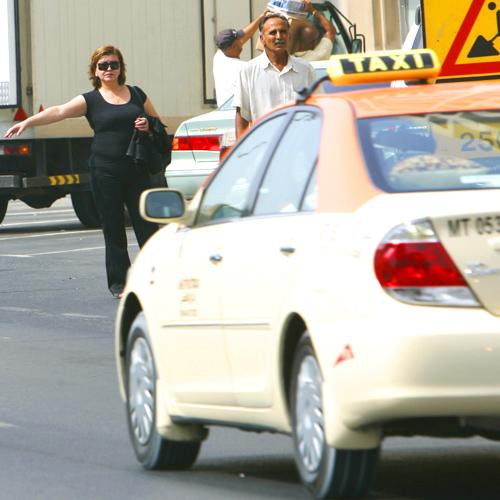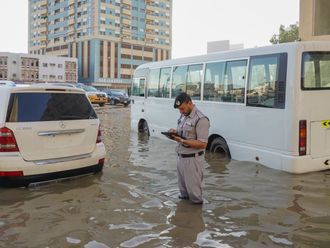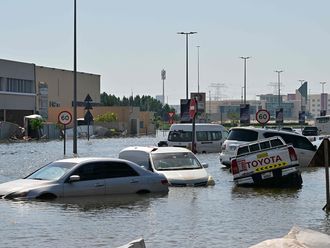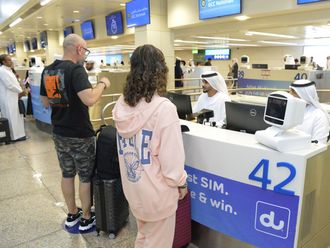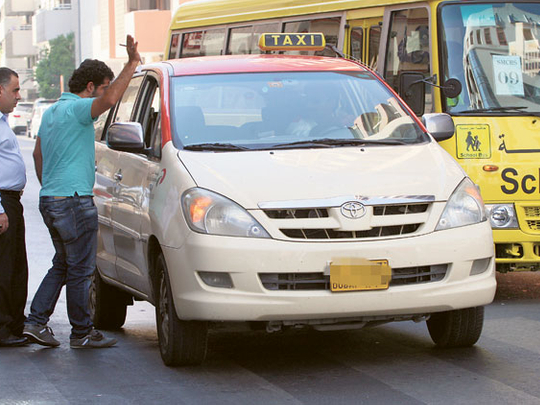
Dubai: For all taxi passengers in Dubai who wonder why they end up in Deira after asking to go to DMC (Dubai Media City), the answer may lie in how the drivers are getting trained.
The Roads and Transport Authority (RTA) currently requires all taxi drivers in Dubai to undergo training and final evaluation.
Engineer Yousuf Al Ali, chief executive officer of Dubai Taxi Corporation said: "The courses at the Driver Training & Qualification Institute focus on several aspects: safety, friendliness, cleanliness, quality of driving and knowledge."
"The drivers must pass an English interview, a theory exam, and lastly a practical driving assessment," the CEO added.
The pass mark to become a licensed taxi driver is 70 per cent.
In addition to the RTA training some taxi companies conduct in-house training sessions.
Mohammad Esmail, a trainer at National Taxi, said that ten-day training sessions are conducted followed by a written exam.
National Taxi is one of the five franchise companies operating under the umbrella of the RTA.
"As part of their training drivers have to know areas, streets, hotels, consulates, and famous buildings and landmarks. The exam tests their awareness on 15 routes and 15 locations," Esmail added.
Practical training consists of "a guided tour through various neighbourhoods on a 30-seater bus," he added.
Once drivers pass the company's exam, 25 out of 30 is the pass mark, they are sent to a 28-day RTA course.
Poor training
With such concentrated efforts to educate the drivers why are they still getting lost?
When eight drivers were asked if they were familiar with the Ismaili Centre, a public cultural landmark in Bur Dubai, and a building in Jumeirah Lake Towers only one actually knew.
Having navigated the streets of Dubai for about a year, a driver who asked to be named as Ali, explained.
"I only spent two days on location training with my company and two or three more sessions with the RTA. I have some education but for someone new and they don't have good speaking or reading [skills], how can they learn locations in such a short time?"
Another driver, Mohammad said: "I only did location training with my company, they took us on a bus to different neighbourhoods. The RTA gave us an exam and we needed 60 per cent to pass." This contradicts the RTA's requirements for a 70 per cent to pass and claims that drivers undergo practice drives.
An official from National Taxi, who requested anonymity, explained that apart from training the best way for drivers to learn routes was through the practical experience of actually driving in the city.
Addressing the inconvenience of passengers thanks to a driver's lack of awareness he said: "If they [the drivers of the company] don't know the place, they can always call the office or ask another driver for assistance."
It appears that matters are not so simple, however, as Ali, the driver, pointed out.
"We are faced with very high targets and the only way for us to make decent money is to meet those targets so we can get a better commission. So drivers don't want to say they don't know a location, thereby losing a customer, or spend time asking for directions, or help."
Having to earn a minimum of Dh370 for each 12-hour shift, Ali calculated his monthly income to be about Dh3,000.
"This is not enough, it is only 30 per cent of the Dh10,000 I make for the company," he said glumly.
Mohammad also stressed that: "The companies make the drivers pay for the training too — Dh2,500. It's a business. The companies are only interested in making money. With all the adherence to policies and rules, it is difficult for a driver to make a good living, so they don't like to stay working as drivers."
"The company then keeps having to recruit new drivers who don't know their way around Dubai, train them and put them on the street."
The process is a vicious cycle. Asking residents of Dubai how they felt about their taxi journeys the major complaints were raised against their dangerous driving and poor customer service.
Nida Amadani, a female resident from Jordan said: "They drive at very high speeds and when you tell them to slow down they ignore you. They also take a longer way and ignore your directions."
Fisayo Oludipe, a female resident said: "The biggest problem is the language barrier. They can't speak English very well. If they're being trained it doesn't seem to show. There's something faulty about the training."
Ramzi Srouji, a male resident said: "When I call a taxi to take me to the airport and he arrives, you could tell he's almost half asleep and fighting to keep his eyes open. When I ask him if he's tired he says yes because it's the end of his shift and it's 12 hours long. I don't blame him but he shouldn't be on the road."
Bad behaviour
Kirsten Elliot, a female resident said: "They talk on their phone while driving and they will look in the mirror back at us, so when I'm with my daughter I always make her cover her shoulders with a [shawl]."
Sarah Aswad, a female resident said: "Their driving is really reckless, they cut in front of you, they're not respecting traffic, and can be a bit aggressive." Karen Rafio, a female resident from the Philippines said: "They're rude and they drive too fast. I meet more rude drivers than polite ones. Plus they don't follow my instructions when they don't know the way."
A taxi driver is subject to retraining only if more than 10-15 complaints are recorded against him, according to National Taxi officials. Despite the fact that Dubai is growing and changing, thanks to new roads, neighbourhoods, restaurants, and hotels every day, drivers don't get updated training.
London's taxi training, ‘The Knowledge' an exhaustive and intense training schedule for drivers, may not be adopted by the RTA any time soon, but a few more training days is a good thing according to Dubai residents.
Efficient training would lead to confident taxi drivers with enhanced safety awareness, familiarity with their surroundings as well as satisfied customers. This would seem like a win-win situation for both parties except, perhaps, for the companies who would prefer to have the drivers working and getting more business.
Taxi ratings across the world
- Rank City Votes
- 1. London 28%
- 2. New York 9%
- 3. Hong Kong 7%
- 4. Tokyo 7%
- 5. Singapore 6%
Source: Hotels.com survey
London's Black Cabs
London's Black Cabs were rated the best by about 30 per cent of travellers and New York's Yellow Cabs came in at number two with 9 per cent according to a recent survey by Hotels.com.
London's licensing procedure requires drivers to pass the test known as ‘The Knowledge'. Part of the exam includes learning 320 routes. On average it takes up to four years to pass according to Transport for London and research has shown it even made the drivers' brains grow larger.
Key content of driver training
1 Customer Service
- Industry: Code of conduct, knowledge of basic English and Arabic.
- Taxi: Cleaning and inspecting the vehicle, using Salik, operating the radio.
- Driver: Personal hygiene, manners, courtesy to other road users.
- Customer: Greeting, assistance with luggage, avoiding discrimination and sexual harassment, processing lost property, dealing with tourists, keeping a checklist.
- Fares and records: Using the meter, receipts, credit card payments.
- Passengers with special needs: Assistance, Body language, proper equipment, taxi booking procedures.
2 Navigation
- Knowledge of locations and routes, using the street directory, practice drives.
3 Rules & Regulations
- Overview, penalties, clauses, rules of behaviour.
4 Taxi Driving Management
- Practical training, taxi Preparation, skills, managing a business, shifts and leave, emoluments, passenger and driver safety, attack and robbery, fuel handling, fatigue management, health and Stress management, accident or breakdown safety procedures, insurance, compensation and trauma counselling.
- What passengers have to say ...


